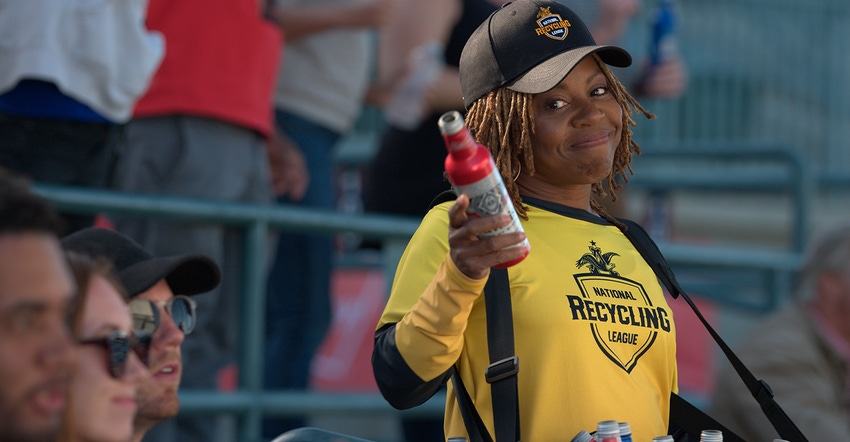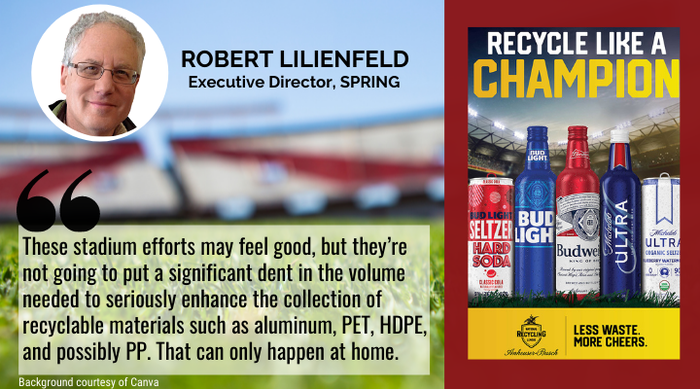Anheuser-Busch’s sustainable initiative allows MLB, NFL fans to recycle aluminum cups, cans, and bottles without leaving their seats. What can we learn?
April 18, 2022

Anheuser-Busch announced last week that it was forming the National Recycling League with Major League Baseball and National Football League partners.
According to its pitch letter, A-B and 10 teams it does business with are “committed to implementing new, innovative activations that reduce waste and improve recycling, including offering aluminum cups to fans instead of single-use plastic.”
Notably, all the beer bottles in their accompanying photos are aluminum as well.
A-B will also be providing “Recycling Hawkers”: Keep America Beautiful (KAB) volunteers who will be deployed throughout the stadiums to collect the empties and ensure that they are properly recycled. A-B will also reward the city that collects the most bottles and cans by offering a free beer to everyone in town (my 15-year-old son is excited!).
What can we learn from this?
First, aluminum cans and bottles are expensive. You can buy 100 of these cups online for $60.00, or $0.60 apiece — about 10 times the price of plastic competitors.
Thus, A-B wants its aluminum back and is willing to pay a pretty penny to do so: I’m sure generous donations are being made to KAB to cover the cost of collection. Plus, buying a beer for everyone in the winning city has its costs as well.
Second, even in a closed-loop system where it should be very easy to collect these containers, KAB’s human resources and A-B’s financial resources are needed to incentivize people to recycle.
Stadium fans don’t even have to find the collection bins. KAB volunteers will grab the empties from them and place them in the appropriate receptacles. No effort needed.
Even in a serve-use-collect loop, people must be cajoled into recycling by making it incredibly convenient (Recycling Hawkers), and potentially remunerative (free beer) to do so.
Sadly, I cannot find any holes in this logic.

Even if successful, these types of stadium efforts may feel good, but they’re not going to put a significant dent in the volume needed to seriously enhance the collection of recyclable materials such as aluminum, PET, high-density polyethylene (HDPE), and possibly polypropylene (PP). That can only happen at home.
Obviously, we can’t afford to send Recycling Hawkers to people’s houses or apartments — or reward them with free beer. Still, if consumers cannot be positively rewarded in a direct manner, they need to feel the pain of not recycling at home as much as A-B feels the pain of not recycling at stadiums.
If we take this same line of reasoning and apply it to residential container recycling, we can clearly see that we already know how to significantly increase both the quantity and quality of collected residential materials: More bottle bills, with per bottle deposit fees greater than a nickel, and probably greater than a dime (see my detailed article on this subject).
So, once again, getting a handle on how best to recycle is as simple to do as it is easy to explain: Follow the money.
Robert (Bob) Lilienfeld has been involved in sustainable packaging for 25 years, working as a marketing executive, consultant, strategic planner, editor, writer, and communications expert. He’s President of Robert Lilienfeld Consulting, working with materials suppliers, converters, trade associations, retailers, and brand owners. He is Executive Director at SPRING, The Sustainable Packaging Research, Information, and Networking Group. You can also write him at [email protected] or visit his LinkedIn profile.
About the Author(s)
You May Also Like




